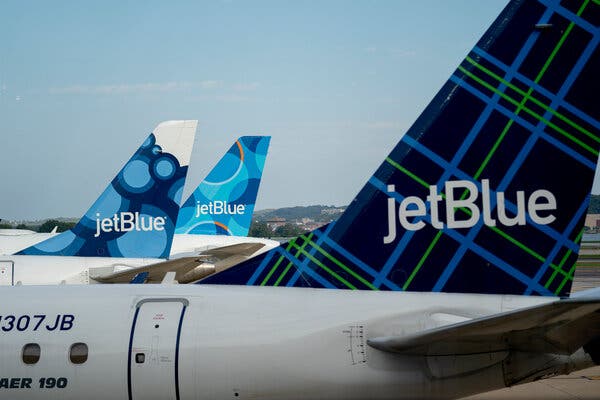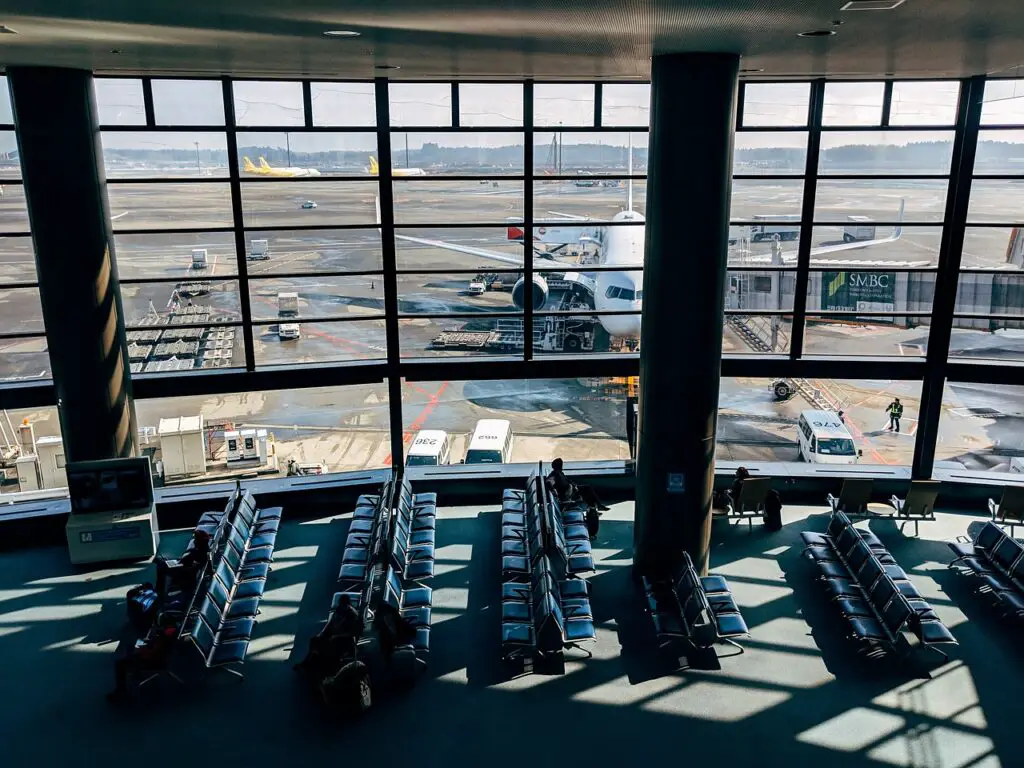Smaller airlines in the U.S. are seeking mergers in order to level the playing field against the industry giants. JetBlue Airways, one of the major players, is currently in talks to acquire Spirit Airlines for a staggering $3.8 billion. The outcome of these potential mergers is crucial not only for the involved companies but also for the entire U.S. airline industry. If approved, these mergers would be the largest in years, granting JetBlue the opportunity to become a more viable competitor to the dominant airlines. However, the Justice Department argues that such mergers would reduce competition and lead to higher fares. With the industry already heavily concentrated, the department aims to prevent further consolidation. The decision on the merger is pending, but if allowed, JetBlue plans to expand its fleet and workforce, bringing forth significant changes for the airline landscape.
The Current State of the Airline Industry
The airline industry is currently dominated by a handful of giants, namely American Airlines, Delta Air Lines, United Airlines, and Southwest Airlines. These industry giants have established a strong market presence and have a significant advantage over smaller airlines. They have the resources and capacity to offer competitive fares, a wide range of routes, and a well-established customer base. This dominance poses a great challenge for smaller airlines who struggle to compete on the same level.
Smaller airlines are feeling the impact of the industry giants’ dominance. They find it increasingly difficult to attract customers and expand their operations. With limited resources and smaller fleets, these airlines often face higher costs and struggle to offer competitive prices. As a result, they are seeking mergers and partnerships to enhance their competitiveness and gain a stronger foothold in the industry.
The Proposed Merger: JetBlue and Spirit Airlines
One of the most significant proposed mergers in recent times is that of JetBlue Airways and Spirit Airlines. JetBlue aims to acquire Spirit Airlines for a staggering $3.8 billion, which would create a formidable force in the industry. The outcome of this merger could have pivotal implications for both companies and the U.S. airline industry as a whole.
The financial implications of this merger are substantial. JetBlue’s acquisition of Spirit Airlines would involve a significant investment, but it also presents an opportunity for long-term growth and profitability. By combining their resources, fleets, and networks, both airlines can take advantage of economies of scale and achieve cost savings. This would enable them to operate more efficiently and offer more competitive fares to customers.
The potential benefits of this merger are vast. JetBlue and Spirit Airlines would be able to compete more effectively against the industry giants. With a larger fleet and combined workforce, they would have the capacity to offer a broader range of destinations and more frequent flights. This would not only attract more customers but also improve their overall market position in the industry.

This image is property of static01.nyt.com.
The Arguments in Favor of the Merger
There are several strong arguments in favor of the JetBlue and Spirit Airlines merger. One of the primary reasons is the opportunity for both airlines to become viable competitors to the industry giants. Currently, the dominance of the big four airlines makes it difficult for smaller airlines to thrive and expand their market share. By merging, JetBlue and Spirit Airlines would have the combined strength and resources to challenge the industry leaders.
Another advantage of the merger is the expansion of fleet and workforce. JetBlue and Spirit Airlines would have access to a larger pool of aircraft and a more extensive team of employees. This would enable them to operate more flights, serve more destinations, and deliver a higher level of service to their customers. The increased scale and efficiency resulting from the merger would create a competitive edge for both airlines.
Furthermore, the merger would improve the market position of both airlines. Consolidation allows companies to consolidate resources, streamline operations, and reduce costs. By joining forces, JetBlue and Spirit Airlines would be better positioned to negotiate with suppliers, secure advantageous contracts, and improve their overall financial performance. This improved market position would benefit both companies and ensure their long-term sustainability.
The Opposition to the Merger
While the merger between JetBlue and Spirit Airlines has its advantages, there are also valid concerns and opposition to the proposal. One of the main concerns is the reduced competition and potentially increased fares. As the number of competitors decreases, there is a risk of limited options for customers, leading to higher prices. Critics argue that the merger could lead to a lack of competition, resulting in less incentive for airlines to offer affordable fares.
Another concern is the prevention of further consolidation. The airline industry has already become overly concentrated, with a few dominant players controlling a significant portion of the market share. The Justice Department is concerned that approving this merger would further reduce competition and hinder the entry of new players into the market. The aim is to prevent the industry from becoming even more consolidated and preserve a healthy level of competition.
Additionally, there are concerns about tacit coordination among airlines. With fewer competitors, there is an increased likelihood of airlines working together to set prices and coordinate their operations. This could lead to a lack of transparency and hinder the ability of consumers to benefit from open and fair competition. Critics argue that approving mergers without adequate safeguards could give rise to anti-competitive practices within the industry.

This image is property of pixabay.com.
The Justice Department’s Role
In evaluating the proposed merger between JetBlue and Spirit Airlines, the Justice Department plays a crucial role. Their primary responsibility is to analyze the impact on competition and determine whether the merger is in the best interest of consumers and the industry as a whole. They carefully consider the arguments and evidence presented by both the defending parties and the opposing voices.
The Justice Department examines the validity of the defense arguments put forth by JetBlue and Spirit Airlines. They conduct a thorough analysis of the potential benefits, such as increased competition and improved market position. At the same time, they also consider the concerns raised by critics, particularly regarding reduced competition and potential tacit coordination. The decision-making process involves a comprehensive assessment of all relevant factors to arrive at a fair and informed decision.
The final decision on the merger has not been issued yet. The Justice Department takes into account various perspectives, expert opinions, and the long-term impact on consumers and the industry. They aim to strike a balance between promoting competition and allowing airlines to grow and thrive. The decision will ultimately shape the future of the airline industry and set a precedent for future mergers.
Potential Effects on the Airline Industry
If the merger between JetBlue and Spirit Airlines is approved, it would have significant effects on the airline industry as a whole. One of the key areas of impact would be fares and ticket prices. With a reduced number of competitors, there is a possibility of fares increasing due to decreased competition. However, if the merger leads to increased efficiency and cost savings, there is also a chance that fares could become more competitive.
The merger would also bring about changes in market dynamics. With the entry of a stronger competitor, the dominant players would face increased pressure to maintain their market share and customer base. This could result in more aggressive pricing strategies, enhanced customer service, and innovations to stay ahead of the competition. The market dynamics would shift as airlines adapt to the new landscape created by the merger.
In the long term, the consequences of this merger could reshape the airline industry. Smaller airlines would potentially gain a stronger position and be better equipped to compete with the industry giants. This could lead to a more balanced market, with greater opportunities for diversity and innovation. However, it is essential to carefully monitor the effects of the merger to ensure that it does not lead to further consolidation, reduced competition, or anti-competitive practices.

This image is property of pixabay.com.
Alternative Strategies for Smaller Airlines
While mergers provide an avenue for smaller airlines to compete, there are alternative strategies that can also be pursued. These strategies focus on leveraging unique strengths and differentiating from industry giants.
Exploring partnership opportunities is one such strategy. By forming alliances or codeshare agreements with larger airlines, smaller airlines can tap into their networks and reach a wider customer base. This collaborative approach allows for resource sharing and the ability to offer more comprehensive travel options to customers.
Investing in technology and innovation is another avenue for smaller airlines to compete. By adopting advanced systems and processes, they can enhance operational efficiency, improve customer service, and offer a seamless travel experience. Utilizing data analytics, artificial intelligence, and mobile applications can significantly enhance their competitiveness and differentiate their offering in the market.
Differentiating from industry giants is also crucial. Smaller airlines can focus on niche markets, offering specialized services or targeting underserved routes. By catering to specific customer segments or providing unique experiences, they can carve out a distinctive position in the industry. This strategy allows for reduced direct competition and the ability to capture a loyal customer base.
The Future of Mergers in the Airline Industry
The airline industry has witnessed a growing trend of consolidation in recent years. Mergers and acquisitions have become increasingly prevalent as smaller airlines seek to compete with the industry giants. This trend is likely to continue as airlines recognize the benefits of scale and increased market share.
However, it is essential to consider the potential impact on consumers. While mergers can create stronger competitors and lead to improved services and efficiencies, there is a concern about reduced competition and increased fares. Regulatory measures need to be in place to ensure fairness and prevent anti-competitive practices. The future of mergers in the airline industry must be carefully monitored and regulated to strike the right balance between growth and maintaining a healthy level of competition.

This image is property of pixabay.com.
Comparison with Past Mergers
To understand the potential outcomes and implications of the JetBlue and Spirit Airlines merger, it is necessary to examine previous large-scale mergers in the airline industry. By learning from the outcomes of these mergers, valuable lessons can be applied to the current situation.
Examining past mergers can shed light on the challenges and opportunities that arise during consolidation. It can help identify potential pitfalls and guide decision-making processes. It is crucial to analyze the impact of previous mergers on competition, fares, and overall market dynamics to inform the decision-making surrounding the JetBlue and Spirit Airlines merger.
The outcomes of past mergers can have significant implications for the current situation. They underscore the importance of comprehensive evaluation, careful regulation, and a consideration of long-term consequences. By drawing lessons from the past, the airline industry can navigate the challenges and maximize the potential benefits of the JetBlue and Spirit Airlines merger.
Conclusion
The proposed merger between JetBlue and Spirit Airlines has the potential to reshape the airline industry and provide a pathway for smaller airlines to compete with industry giants. The outcome of this merger could have far-reaching implications for consumers and the overall market dynamics.
The arguments in favor of the merger highlight the opportunity for JetBlue and Spirit Airlines to become viable competitors and expand their market share. The potential benefits of increased fleet and workforce, improved market position, and enhanced economies of scale make a compelling case for the merger.
However, there are valid concerns raised by the opposition, including reduced competition and potential tacit coordination among airlines. The Justice Department plays a crucial role in evaluating these arguments and determining the impact on competition and consumers.
The airline industry must carefully consider the potential effects of the merger, such as changes in fares, market dynamics, and long-term consequences. Alternative strategies, such as partnerships, investing in technology, and differentiation, should also be explored by smaller airlines looking to compete.
The future of mergers in the airline industry requires careful monitoring, regulation, and consideration of the lessons learned from past merger outcomes. The final decision on the JetBlue and Spirit Airlines merger will have significant implications for the airline industry and its ability to maintain a balance between competition and consolidation.

Source: https://www.nytimes.com/2023/12/05/business/jetblue-spirit-justice-department-trial.html
